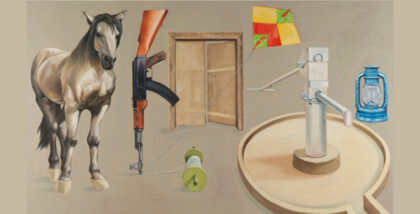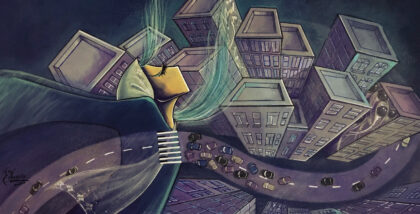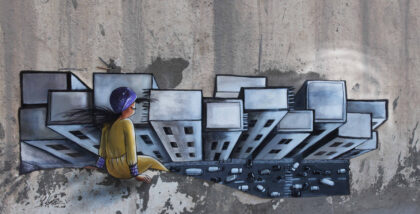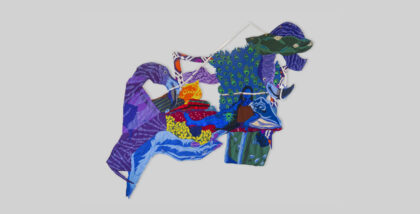 Shahrara, Hangama Amiri. Courtesy of the artist.
Shahrara, Hangama Amiri. Courtesy of the artist.
Translated from the Persian, with prologue, by Salar Abdoh
What follows are six tales of Afghan women forced to flee their homes or stay amidst strife. There could be sixty, six hundred, six million—each really a variation of the same story. Lives crushed. Not once, but time and time again. I have encountered suffering of impossible magnitude in the wars I have known. Yet Afghanistan’s case has always been unique, the exceptional cruelty wrought upon the women of the land on another scale altogether. When I met Toteya, a refugee in Trebizond, Turkey, where she has taken up the task of collecting accounts from her fellow sisters, I asked her to just give me the facts, unadorned. Because the combination of hearing, recording, and not forgetting is a first step in countering the horrors these women have known as they make their way through one walled border to another so that they can, literally, breathe.
—Salar Abdoh
Toteya’s Story
When I was a child I kept two posters on a wall of my room. One was of a goalkeeper named Wakabayashi from a Japanese cartoon series and another was of the then-president of Iran, Mr. Rafsanjani. We were refugees living in Iran at that time. I still have no idea what these two characters, one real and one fictitious, had to do with each other and why I was so absurdly drawn to a president of a country that wasn’t even mine. Still, these were the heroes of my childhood, and whenever I accomplished something, I’d run to my grandmother with a question: “Do you think Mr. Rafsanjani is happy with me now?”
Grandmother would laugh and say, “Of course, the man loves you.”
One day when my grandmother wasn’t feeling all that well, I asked, “Maman-jaan, if I sweep the front yard, do you think Mr. Rafsanjani will notice?”
She was sitting there moving earth around with her gardening trowel and she looked at me and muttered, “You’re just an Afghan. Mr. Rafsanjani is for his own people.” Then she went back to mechanically turning earth and weeds with her tool.
I was devastated. Just an Afghan! I ran into my room crying until sundown, the whole time Wakabayashi’s and Mr. Rafsanjani’s posters staring back at me.
I cannot deny it, the day I was told I was just an Afghan was a painful one. The word “Afghanistan” was too big and serious for a kid. It smacked of screams and bullets and the weapons that we always heard about and saw on television. It was about as far removed as could be from my innocent world of toys and dolls and colored pencils. I thought to myself: I no longer have any right to idolize one of my favorite people and certainly this man, Mr. Rafsanjani, is never going to like me either. It was a sudden moment of growing up, one that instantaneously threw me into a parallel life where I had to pay careful attention to the tragedies of another country called Afghanistan.
From then on I would always imagine Afghanistan as a much-bereaved mother who, out of necessity, had to let go of her children. Then at some point, like a lot of refugees, we too left Iran for the imagined opportunities of Europe. We were identity-less people, without passports or residency cards of any sort. We traveled surreptitiously and always through circuitous routes. More than once I had to grab for a vicious bush of thorns on some high mountain pass so I wouldn’t fall hundreds of meters to the bottom. You can summarize the refugee life in this one image: grabbing for a thorn bush that always leaves you bleeding.
Now in Turkey—again a refugee, always a refugee—I’ve managed to get myself together enough to start collecting the stories of other women, too.
Here is a series of brief stories I collected from women like me, all of whom carry the memory of a scorched country everywhere they go.
*
Nooriye’s Story
Somehow, through the virtual world, she had found out I was collecting the stories of Afghan women. She had gone through dozens of people until she found my number. She wrote in WhatsApp, “You are Toteya who is writing our stories? Would you write mine?” She was contacting me from a remote village in the Bamiyan province in Afghanistan, the region where the Taliban had destroyed the ancient towering Buddha statues. What was it that drove someone like Nooriye to find me? We were thousands of kilometers apart and I didn’t even know if these narratives I was collecting would ever be seen by anyone. Still, I listened to her story, whenever there was enough internet on her end to give us a minute or two. She had lost her younger brother to the bread oven, she said. The boy had fallen in and never come out. Her mother had lost her hearing as a child. And her father was now giving her away as a bride to a 72-year-old man. She had just turned 18 and had loved to play basketball once. Often in the middle of our conversations she’d excitedly ask when these stories would be published. It was her one spark of hope. Hope for what? I wasn’t sure. I only knew that I was two countries further west than her and with that 72-year-old fiancé, all hope of ever leaving Afghanistan was lost for her. Then one day her phone went silent for good.
*
Malala’s story
Every refugee had to appear at the building once a month and show that they were still living in Turkey. I noticed her huffing and breathing with difficulty as she came slogging toward me with three little girls practically hanging off her. She looked panic-stricken.
“Miss, miss, please wait. One moment, wait! Can you show me the health office? I cannot speak their language here. I cannot speak Turkish.”
“I’m going in the same direction,” I answered. “Come.”
She smiled a tired smile and started walking alongside me after telling the kids to wait for her. Every other minute she sprayed alcohol on the palms of her hands, fixed her hijab, and examined the folds on her sleeves. Her movements were erratic and hinted at severe OCD. It was not easy talking to her. She would answer in short, speedy bursts and quickly fall silent.
What a miracle that she’d managed to even get this far with her three daughters. I found out she was only five years older than me, but her hair had already turned white and the skin of her hands was like parched earth. When she told me her age, I tried to act natural. But my surprise must have shown.
She finally laughed. “I know, I look a lot older than 30-something, don’t I?” She paused and added, “They killed my children’s father in front of me. I died that day.”
I was silenced, unable to speak. The OCD, the premature white hair, it all made sense now. There was a tremor in her voice every time she mentioned her husband. The Taliban had killed her husband inside their family’s flour mill. She went through the minutiae of that night as if she were a lens describing action taking place in front of her.
The seagulls above us were making a racket just then. I didn’t have the heart to tell her we’d arrived at the health office. So we ended up sitting on a bench nearby and she continued talking without another mention of the health office. For a refugee often just having someone listen is everything.
She and her family were Hazara Shiites, an ethnic group whom the Taliban have always been specially savage toward. After the night they killed her husband, Malala, who was six months pregnant, miscarried. Then she turned mute, utterly mute, for two years. The terrifying escape through impossible mountain passes and hostile territory was something all of us were familiar with. Still, I had no idea how she had done it alone with three kids in tow.
We finally stood up, she called her kids and took them into the health office where they administered the vaccines she’d come for. Then I watched her walk away. It was as if I was a stranger and she hadn’t been crying into my shawl just minutes earlier. It’s like that sometimes. Our situations could easily have been reversed. The difference was just one of five years.
*
Mahtab’s story
It was a rainy day. We had agreed to meet at the bus depot. The first thing I noticed was a deep scar on her arm. I asked her about it.
“I was 13,” she said in a voice that seemed to enter a kind of a time tunnel. “One night my father didn’t come home. The next day they told us he was dead.”
Her father had been a commander once and the Taliban had assassinated him. With the man of the house gone, all they had to live on was their meager savings. Her mother’s breasts went dry and the baby would cry all night. For a while a family friend helped them out until he too left the country. Eventually one of the neighbors told her mother to send Mahtab to Mr. Bashir’s house to weave carpets. The man was well-off and owned a workshop. The first time he got a glimpse of Mahtab, he observed, “This little girl can barely stand on her two legs, how is she supposed to weave for me?”
But weave she did, proud that she could finally buy bread and milk and help her mother. There was continuous coming and going at Bashir’s house, a place where things got bought and sold all the time. Bashir himself, a single man in his 60s, was not an unfair boss.
Then it happened. One day, one of the Taliban came to his place. The house was quiet and Bashir was off to Kandahar on some business. The Talib, who was about 40, stood in the middle of the yard and called out. Eventually he spotted Mahtab, who sat behind the loom desperately trying to avoid the intruder’s eyes.
He came up to her asking again for Bashir, the reek of his sweat now on her. “You’re a nice-looking girl. Who owns you? Aren’t you that same girl who lives in the narrow alley back that way?”
Saying nothing, Mahtab got up, intending to make a run for it. The man grabbed and pulled her back. He threw her behind a short wall they’d set up for feeding the animals.
She hit her head against a metal pail and gagged. She wanted to scream but nothing would come out. When he tried throwing himself on her, she kicked him hard. He reached for a sickle lying on the ground and brought it on her arm while pressing on her mouth with his free hand.
She was already thinking this was going to be the end of her. Just then a local boy named Yahya jumped over the outer wall. He was 18, the neighbor’s son, and tasked with buying and bringing bread to Bashir’s house each day. His father had also died fighting the Taliban some years earlier.
Yahya and the Talib started to fight.
“Get away from here,” Yahya yelled. “Quickly. Go!”
She ran all the way home crying. As soon as her mother heard the story she began beating her chest and wailing. They were done for. It was only a matter of time before someone came for them. They locked the doors from inside, drew the curtains, and turned out the lights. Fear gripped them. Mahtab forgot about her bleeding arm. When twilight came someone knocked on the door and whispered, “Auntie, auntie, Yahya killed the Talib.” It was a young boy’s voice. “You all better run from here.”
They heard the boy’s footsteps as he ran off.
Mahtab’s mother was hysterical. “We’re done for!” She kept repeating. “We’re done for!”
They barely slept that night. In the morning there was another soft knock on the door. It was Bashir. The man had completely lost his former confidence and authority. He handed Mahtab’s mother some money.
“Sister, leave this place. Go and never return. A Talib has been killed because of your daughter. Don’t look back. Leave now!”
As soon as he was gone, they got to work—a few pieces of bread, the clothes on their back—and they were out of that house for good.
Mahtab’s prized possession was her dead father’s photograph. It was the only thing that gave her some solace. Bashir had told them an address to go to and the money he had given them was far more than Mahtab’s usual pay. The entire way, her mother would open the cloth that the money was wrapped in and whisper, “May God bless you, Man. May God always bless you.”
A lifetime. That was how long it seemed to them before they passed one border and then another until they were finally in Turkey. Time and again her little brother almost slipped out of their hands while they negotiated some nearly impassable switchback. One time she noticed a dead boy far down the mountainside and for months after she would have nightmares about it. Her arm never had a chance to fully recover and she couldn’t easily grab hold and pull herself up the rock faces they had to climb. The damaged hand’s fingers could barely move.
They did finally manage to save themselves, though word also reached them that Yahya had been found hiding at his friend’s house. The Taliban killed both young men. The friend who had given Yahya shelter had recently gotten married.
“To the end of my life, I have to live with Yahya’s death,” Mahtab told me. “He died for my sake. So did his friend.” Wiping tears with the corner of her hijab, she added, “Can you not use my real name? I’m afraid they’ll find me again. I’m always afraid.”
In Turkey, Mahtab eventually received an operation on her arm and she could feel again. I squeezed that same arm gently and promised her I would not use her real name. Mahtab—moonlight—that was the name I’d use. Seven years had passed since those days. But the terror would not leave her. Not here, not anywhere. There’s no sanctuary from certain horrors.
*
Reyhane’s story
Her name was Reyhane and she lived in Kabul. She had a young voice over the phone, but it was filled with anguish. Whenever she had to mention her sister, she paused for a few seconds before continuing.
Her story began on the day her mother went out to buy bread and came back with a bloody face and the lifeless body of Reyhane’s sister, who was barely two years old. That day in the neighborhood dozens of people died or were injured from a Taliban attack. She recalled her mother sitting in a corner of the yard, in shock, while her father gently took the child out of his wife’s hands and hurried to the hospital.
It was too late. It had been too late even before her mother got home. “From then on, we walked around, we worked, we went through the motions of life, but it was as if we were the living dead. My little sister’s killing ended something in all of us.” Four years later the Taliban killed her father as well. Ever since, the only two objects that kept her going during moments of utter despair were her father’s photograph on the mantelpiece and her sister’s rag doll leaning next to it.
In school, her focus had been math, until the Taliban banned schooling for girls her age and older. Her next-door neighbor Soraya was also passionate about math. Soraya’s father eventually tore down a wall down between the two homes so that the girls could study together without having to leave the house at all. Soraya’s sister reminded Reyhane of her own lost sister. The little one would sit next to them, pencil in hand, and draw while the girls worked through their math problems. They studied through two terms that way. At the end of each term their school principal came to the house, confirmed their work, and encouraged them to continue.
Soraya’s father was a good man. He kept Reyhane and her mother fed. He’d bring tailoring jobs for Reyhane’s mother so that she wouldn’t have to leave the house and risk a thrashing by the Taliban.
Then it happened, as it always does in Afghanistan. The Taliban attacked Soraya’s home one night having apparently gotten wind that Soraya’s father was involved in anti-Taliban activity. The women screamed and pleaded with the intruders not to take their man away. A Talib came back to the house and kicked the door in. “Raise your voices again and we’ll strangle you.” Then his gaze fell on the torn down wall between the two homes. Reyhane and her mother were cowering in a corner, fearful of what lay in wait for them. The Talib now went around yelling profanities and threatening to kill them all.
“Where’s your man?” he demanded to know.
“My husband was martyred. Leave our house now. Please!”
“Shut your mouth.” The Talib took the framed picture of Reyhane’s father and threw it to the floor. “Not martyred. Just dead.” Then he spit on the photograph and stomped on it with his foot.
That cursed night seemed to never end. Reyhane took the rag doll off the mantelpiece and hid it out of the way for good.
They never found out what happened to Soraya’s father. They did not know if he’d been killed or imprisoned. After a while Soraya and her mother began wearing black. What remained in the two households was a broken picture frame, an old, never again opened math book collecting dust, and a rag doll that, Soraya wanted to imagine, still carried the scent of a little girl killed years earlier on the way to the bakery.
*
Bibigol’s story
She wore traditional spotted tattoos on her chin and spoke with an accent that was hard for me to understand at first. It had taken three days to get her to come to my place to tell her story.
Her mother had died while giving birth to her and the Taliban had killed her father during their first takeover of the country. Bibigol ended up having to live with an elderly uncle whose children had long ago married and moved on. The uncle worked on a cattle farm and had a hole-in-the-wall that he now shared with Bibigol. “The farm owner was a mean-spirited man named Monavar with a very long beard and a bad leg. Every time he saw me, he’d say the same words: ‘a girl has to work to earn her keep. An idle girl is haram and of no use to anybody.’” The man made her anxious, but she tried not to show it.
At some point Monavar did not show up for a whole week. Bibigol was 12 by then. The farm owner’s absence brought peace to their place for a change. Her uncle said that the man’s daughter had apparently been sick for a while. When Monavar did finally show up, he was not his usual terrorizing self. He stood outside and talked quietly with Bibigol’s uncle for a while. Then he came inside, glanced less harshly than usual at Bibigol, and asked, “How are you, Bibigol?” It was the first time he had actually set foot inside their little hovel. In his hands he carried several bags and boxes of food he’d brought as gifts.
She served him tea. On his way out, Monavar turned to Bibigol’s uncle. “Use your brain and be smart about my offer.”
She could tell her uncle was not in a good way and it must have something to do with her. Every time his glance met hers, he’d sigh and turn away.
Next morning Monavar showed up again. Without even bothering to address Bibigol’s uncle, he told her to get ready to go to the doctor’s office.
She was afraid. “But there is nothing wrong with me,” she barely protested.
“It is necessary. You must be examined.”
At the doctor’s office the first thing they did was to take her blood. Hours later they made her change and wheeled her into an operating room. The only thing she remembers of those moments is her anxiety at all the various sharp surgical equipment. Several times in a trembling voice she called to the doctor, who appeared to be a friend of Monavar, and told him she was perfectly fine and had no pain or anything.
No one paid her any mind.
When she came to, she felt dizzy and weak. The thirst was unbearable. She could not recall why she was on that bed. She tried to get up to drink something. A sharp pain on her side stopped her. She screamed and fell unconscious again. She had no idea how long she was out. The next time she opened her eyes she was back at the shack and her uncle was with her. There was a clean mattress her uncle would only bring out for guests. She was lying on it. Every time she asked what was happening, her uncle would quietly whisper that it would be alright and that she’d feel better in no time.
Despite the ongoing pain, after a while she managed to slowly get up and walk around. But the first time her eyes fell on the stitches on the side of her body, she almost passed out again.
Later, she would learn that Monavar’s daughter had had a kidney disease and needed a transplant. Bibigol had apparently been a good candidate. In return, Monavar had allowed her uncle to continue working and living at the cattle farm. He no longer threatened to throw them out and had even given them extra pay for the next few months.
She never asked her uncle why he agreed to the deal. The old man was obviously not given an alternative. To this day, each time Bibigol takes a bath and has to look at the proof of what they did to her, she’s taken right back to that operating room and to the menacing voice of Monavar, repeating that a girl had to earn her keep.
A few years later, because of the mark on her body, she had no choice but to be married off to a man fifteen years her senior and already with two wives. Before long she had a son from him. The man died not long after. Heart attack. And with the Taliban back in power, Bibigol eventually packed her few belongings and made her way to Turkey with her son, Ali.
“I never had a childhood,” she said. “None of the girls in Afghanistan have known childhood.” Then, offering a bitter smile, she added, “Here one can wear colorful clothes. I can go outside and look up at the sky without anyone asking what I’m doing.”
I watched Bibigol as she got ready to leave. She turned and called my name. “Toteya!”
“Yes?”
“You know, in Afghanistan each girl is an unhappy story. One girl loses her life. Another loses her love. Another her family. And another like me loses her kidney. But before any of these losses, the girls of that land lose their will.”
I walked her out. When I returned, I scanned the scattered pieces of paper on which I’d written her story. On each page I could hear the voice of a 12-year-old girl who kept pleading inside a chilly operating room: “But I’m alright. I’m not in pain or anything.”
























